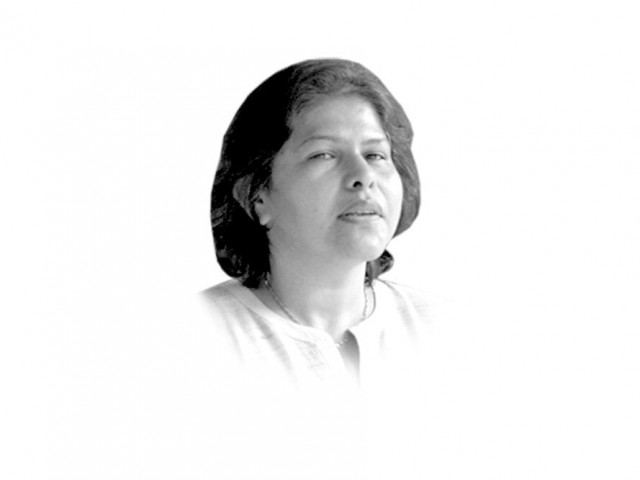Fighting terrorism
There is a need to identify sources of radicalism, get stakeholders on board, to counter such ideological forces.

The writer is an independent social scientist and author of Military Inc. and was a media consultant for NAB from 2011 to 2012
The provincial government has promised to reconstruct the building in three months. However, there is lesser clarity regarding the fate of the Lashkar-e-Jhangvi (LeJ) jihadists who kill people almost every single day. Due to our peculiar focus, we will not even be inclined to ask how a province and people known for liberal religious traditions got occupied with takfiri jihadis who, like the German fascists, believe in killing anyone that does not subscribe to their values and scheme of things. Poverty and poor governance, of course, are obvious but simple explanations. These two factors can drive people towards frustration and violence but not necessarily of the kind that seems to be growing in Balochistan. People can get frustrated due to poverty and vent their anger against the state for what they may consider as brutal negligence but not necessarily become part of the religious-ideological jihadi network that has grown exponentially in the province, especially in the past few years. The state has played no part whatsoever in questioning or stopping the systematic growth of Deobandi and Salafi jihadi networks in Balochistan or even the rest of the country. Why are we so silent when we see the Salafi LeT/JuD network or the Deobandi SSP/LeJ/JeM network penetrate Balochistan and Sindh and gain ground in these territories?
Ethnic politics and nationalism is comparatively a solvable issue. The jihadis who now want to change the future of the state are far more difficult to negotiate with. The LeJ in Balochistan is busy exploiting and recruiting Baruhis to fight against the Baloch. Interestingly, al Qaeda, to which the LeJ is also connected, is trying to provoke Baloch nationalism. In the recent publication Al Hateen, the local al Qaeda has talked about an independent but Islamic Balochistan. This politics is transforming society and so, as a result, we even see some Baloch political parties aligning with the ASWJ/LeJ political network. This is certainly out of political expediency, but the formula is as bad as in any other part of the country, especially Punjab and Sindh.
While we mourn the damage done to a building where the founding father spent some time, we forget that the takfiris and their radicalism, which seems to be spreading gradually, will kill the Pakistan which Jinnah envisioned, that is if it has not happened as yet. The al Qaeda that we dislike now has local franchises that, in turn, are ingrained in society. We continue to draw a distinction between the good and bad jihadis, not understanding that ultimately, they all tend to drift together on the basis of their ideology. The explanation for giving protection to certain religious radicals or their groups is that the military leadership does not want to start a civil war in the populated parts of the country, while it is busy sorting out the war in the tribal areas. Nonetheless, this does not explain why the security establishment continues to tolerate the ideological expansion of these groups and the fact that they are constantly recruiting people. Surely, the banners calling for jihad posted on government hoardings on the National Highway in Punjab do not indicate an intention of these groups to stop their struggle to capture society.
Surely, the recipe that the new government is most likely to entertain is negotiations with these groups. But what is there to negotiate except the future of the country? Will Hafiz Saeed and Masood Azhar, along with their gangs, settle at anything less than a drastic change in the ideological direction of the state? This is not about wanting or not wanting Islam on the basis of which this country was made but about the capture of a religious ideology by vulgar extremism.
The new interior minister has to be clear on one thing at least, that he cannot save buildings unless he can protect people from such vile extremism. This requires for him and his government to construct a solid policy on terrorism and counter-radicalism. There are several necessary steps which ought to be taken, starting from building consensus and cooperation amongst the various intelligence agencies. To get them on the same page, nonetheless, requires clarity on the issue. The government now has a tool that it can work with in the form of the National Counter Terrorism Authority and the relevant Act. There is a need to identify sources of radicalism and get various stakeholders on board, including the media, to counter such ideological forces. The government must focus on countering radicalism as this is an even larger issue than terrorism. In fact, acts of violence indicate the tip of the iceberg of radicalism. You cannot remove one without removing the other. This consistent ideological transformation that started during the early 1950s but speeded up after 1979-80 must stop if the country has to be made livable for most. It’s nothing to do with sacrificing the Islamic character of the state but is about taking the violence out and making it a place worth living for future generations.
Published in The Express Tribune, June 20th, 2013.
Like Opinion & Editorial on Facebook, follow @ETOpEd on Twitter to receive all updates on all our daily pieces.














COMMENTS
Comments are moderated and generally will be posted if they are on-topic and not abusive.
For more information, please see our Comments FAQ